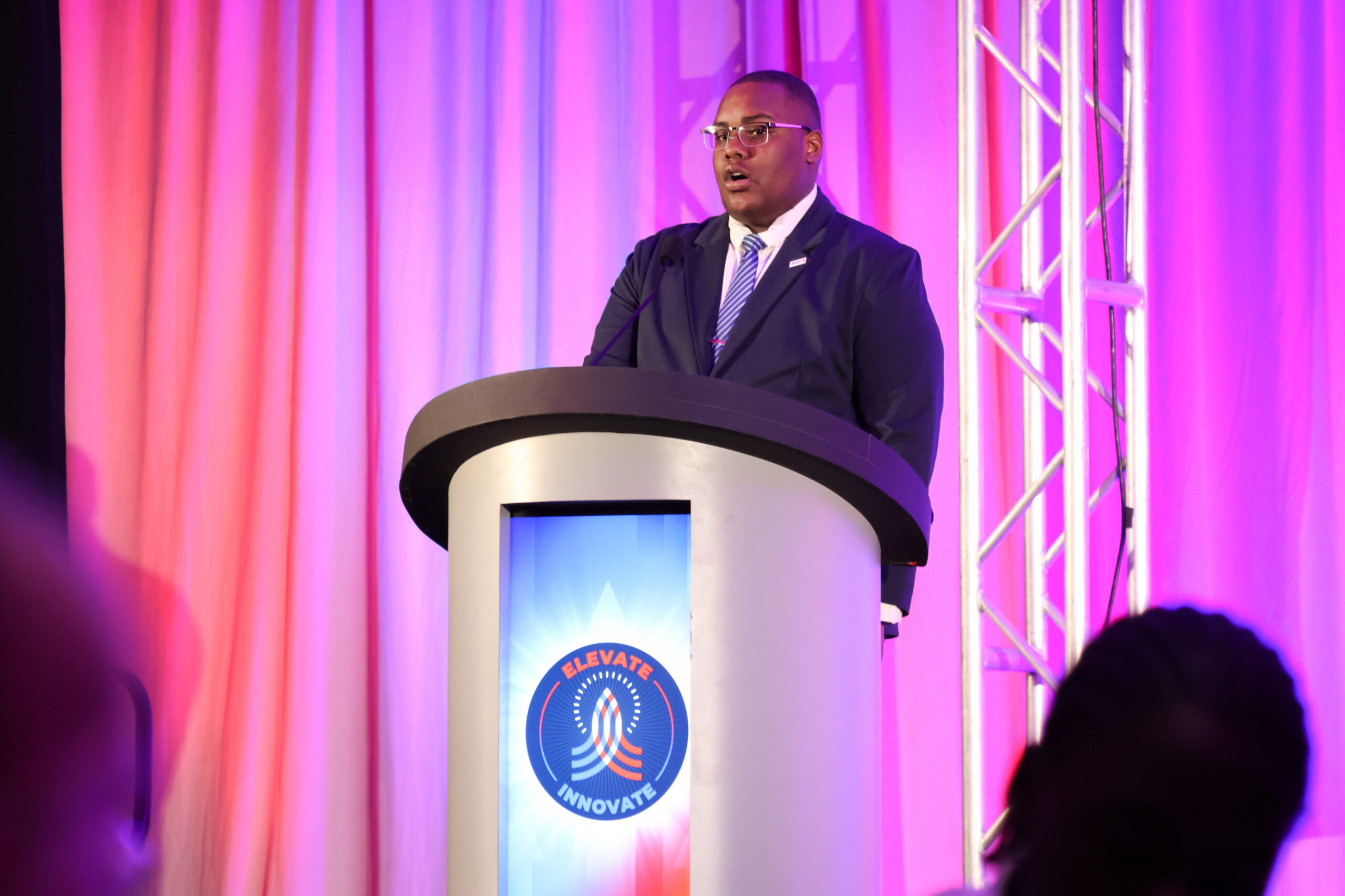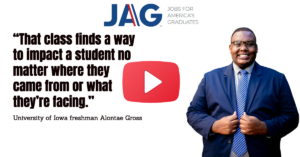DES MOINES, Iowa — A budding thought leader already with a lot to say about youth incarceration both summarizes and solves the problem with a soundness belying the 19-year-old’s mere days into just his second semester at the University of Iowa.
“There’s clearly a pattern, and we’re not doing anything to address that pattern. Continuously throwing these individuals in cells isn’t going to make the pattern decrease. It’s either gonna stay consistent, or it’s going to keep increasing,” Alontae Gross said. “It’s more than just looking at what the individual did. It’s looking at where the individual came from; what is the motive behind why the individual may have did what they did; and what can we do to help this individual out so that they may not go down that path of crime, because sometimes an individual might just end up in the system because they stole food because their parents are too poor to afford food for them. Is that a valid reason for the person to be in the justice system for the rest of their life? No.
”Youth incarceration is declining, actually, according to the U.S. Department of Justice Bureau of Justice Statistics. Young people 17 or younger locked away in U.S. adult prisons or jails peaked at 10,420 in 2008. In 2021, those same walls of confinement held 2,250 young people, a 78% decrease. That’s a lot.
The downside is data also pegging the incarceration rate for Black youth at four times higher than white youth and three times higher than Hispanic youth, according to The Annie E. Casey Foundation. Black males, in particular, comprise a disproportionate number of those incarcerated, some of that the result of over-policing in their communities, a view widely held by social scientists and substantiated by research.
Gross is young, Black and male. Yet he rose above the stats — planted his feet and pivoted, using Jobs for America’s Graduates (JAG) as a compass providing direction.
“Before JAG, life was kind of all over the place,” Gross said. Gross never has been incarcerated. No trouble with the law, either. Life was tough for him, though, one of 14 siblings. His father wasn’t around. “I was at a point where I was really facing those barriers, mentally struggling and, you know, debating whether or not putting effort into my education was worth it,” Gross said. “And I was just at a really low and dark point, and I needed some guidance to help me get out of that dark spot. And then JAG came into my life and really ignited a spark.”
Immersive career exploration
The way JAG works is through immersing students in career exploration. It’s not a one-off career day. No, JAG is incorporated into students’ class schedules. It’s a daily priority, as essential as English, math, science and other core coursework, according to Tych Cowdin, executive director of Communities in Schools of Chatham County. It’s affiliated with Communities in Schools of North Carolina, which offers Jobs for North Carolina’s Graduates (JNCG), a JAG offshoot.
“By equipping youth with essential skills, guidance and mentorship, the program not only enhances individual outcomes but also contributes to workforce development, ensuring that local economies thrive,” Cowdin said. “Leveraging the unique strengths and resources of each community, JNCG empowers youth of promise — particularly those who face barriers — to reach their full potential.”
More than a wraparound service, the JAG model is malleable. Students get in where they fit in. They’re exposed to a variety of careers, not just what they’re initially interested in pursuing. Sometimes that leads to students switching career gears, the exposure opening their eyes to other options.
“That is exactly how it is,” Gross said. “In my JAG classroom, there were students who had very different paths. There were students who weren’t even planning on going to college, and that’s OK. There were students who wanted to go straight into the workforce. JAG brought in guest speakers who offer opportunities for high school students to go straight into the workforce without going into school. There are some students who just want to go to community college or four-year universities; we had schools come in and talk to us, as well. There’s people from a whole bunch of different paths that would just come in and speak to us. And although every student might not be interested in that path, there was always something to gain from that guest speaker.”
JAG is supporting 83,551 young people across the country. Students participating in JAG graduate at a roughly 97% clip, around 10% higher than the overall high school graduation rate in the United States. About 58% of the students who participate in JAG go to college.
Gross is a college freshman studying criminology, law and justice.
“If it was not for JAG, I would not be at the University of Iowa. And I only say that because, like I said, before joining JAG, I was really at that point where debating if education was even worth it, and in a household that I grew up in, no one went to college,” Gross said. “I always knew that I wanted to continue my education, but I didn’t think it was an option because I didn’t have that brother, that sister, that mom or dad to help give me the guidance that I needed in order to take on that path. … JAG opened me up to the different paths that I can take after high school, collegebeing one of them, showing me how to fill out my first college application, how to fill out FAFSA, and showing me all the scholarships and awards that are available to help me pay for my college education. And that’s when I instantly knew that college was an option for me.
”JAG didn’t provide the scholarship dollars that essentially have Gross attending college with no financial burden on him or his family. What JAG did was give him the wherewithal to pursue those scholarships. Just like JAG positioned him to become the organization’s first career association president in Iowa before earning distinction as parliamentarian of JAG’s national career association. Gross represents JAG as a board member for America’s Promise Alliance. He founded the Black student union while at North High School.
Lifeline
Cory Jenkins is regional manager for Iowa Jobs for America’s Graduates. Before that, he was a JAG specialist at North High School in Des Moines. That’s where he met Gross, back during the kid’s dark days.
“Like many of us, he came from a family that wasn’t perfect, and I wanted to be a positive influence in his life,” Jenkins said.
Jenkins was that and then some — a father figure, Gross said.
It was about giving Alontae the lifeline he needed to keep holding on, Jenkins said.
“I’m sure there were moments he thought, ‘Mr. Jenkins is doing too much,’ but he trusted me and pushed forward regardless,” Jenkins said. “I recall a situation involving another teacher that became a pivotal moment for Alontae. He felt the teacher was singling him out and pushing him too hard. We sat down and talked it through, and Alontae eventually realized that the teacher genuinely cared about his growth and didn’t want him to settle for mediocrity. That experience was a significant step in his development, showing his ability to reflect and grow from challenging situations.
“This program demonstrates the transformative power of education and opportunity,” Cowdin said. “By prioritizing the development of young people and aligning their talents with real-world workforce needs, JNCG fosters a cycle of resilience, leadership and innovation. The program is a testament to what can be achieved when we collectively invest in our youth, preparing them to become the skilled, confident and committed leaders of tomorrow.”
Return on investment
For all of the investment that goes into JAG, Gross said he’s the quintessential dividend.
“JAG is like that friend who pushes you onto the roller coaster when fear is holding you back. I used to fear I wasn’t qualified enough for these opportunities, worried about being accepted or doubted because of the color of my skin. JAG helped me face those fears, overcome those roadblocks and embrace the journey,” Gross said. “I’m thinking about pursuing a career in law,” he said.
He’d planned on going after a career in medicine until his involvement with Iowa Youth Congress provided hands-on experience lobbying legislators, and that altered his career trajectory, fueling a passion for finding alternatives to youth incarceration.
“It’s just something about that experience that changed everything for me. Being that advocate for change and speaking for those who don’t have the voice to speak for themselves,” Gross said. “Something about law spoke to me.” JAG whispered first. “That class finds a way to impact a student no matter where they came from or what they’re facing,” Gross said. “Before JAG, I was nothing like the individual I am today.”


